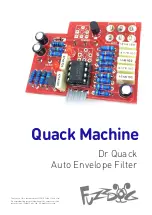
Manual – Starflow QSD Model 6527B and 6537A
Unidata Manual - 6527B and 6537A Starflow QSD User Manual 08 05 2023.docx
Page 13
4. OPERATING PRINCIPLES & MEASURED PARAMETERS
The 6527B and 6537A Starflow QSD measure:
- Flow
velocity
- Depth
(ultrasonic)
- Temperature
- Depth
(Pressure)
- Electrical Conductivity (EC) – 6537A Only
- Tilt (the angular orientation of the instrument)
The Starflow QSD performs data processing and analysis each time a measurement is
made. This can include rolling averaging and outlier/filter functions for Depth (ultrasonic),
Velocity, Depth (Pressure) and Conductivity (6537A). The function parameters can be
configured via SDI-12 eXtended command or Sonic software.
4.1
Flow Velocity Measurement
For measuring velocity, the Starflow QSD uses Continuous Mode Doppler. An ultrasonic
signal is transmitted into the water flow, and echoes (reflections) returned from particles
suspended in the water flow are received and analysed to extract the Doppler shift
(velocity). The transmission is continuous and simultaneous with the returned signal
reception.
During a measurement cycle, the Starflow QSD emits a continuous signal and
measures signals returning from scatterers anywhere and everywhere along the beam.
These are resolved to a mean velocity that can be related to a channel flow velocity at
suitable sites.
The receiver in the instrument detects reflected signals, and those signals are analysed
using digital signal processing techniques.
Internally the instrument auto-scales over these ranges if the range is manually set in
the settings: A bidirectional velocity capability is a supported option but needs to be
configured using Modbus or SDI-12 commands as the default setting is positive flow
only.
20mm / s to 0.8 m sec
20mm / s to 1.6m/s (default)
20mm / s to 3.2 m/s














































